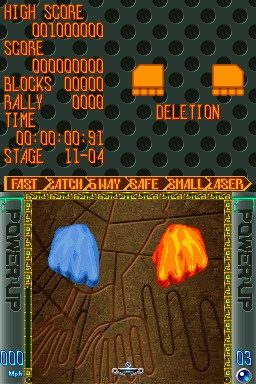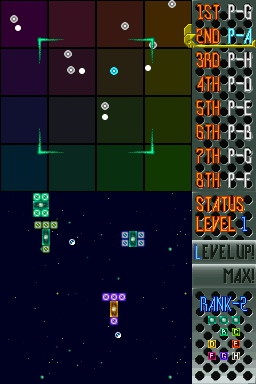Did you like Breakout back in the late '70s? How about Arkanoid in the '80s? Are you still playing some variation or another of these classic but aging titles? Then D3's Break 'Em All for the Nintendo DS ought to be like Christmas come early for you. Taking the classic block-breaking concept of the aforementioned games, and adding in some varying mode types and a Gradius-like power-up structure, Break 'Em All has some merit as an update to those classic games. But it also doesn't necessarily pull off everything it tries to do. The ball physics sometimes come across as rather haphazard, and most of the game's multiplayer functionality just isn't much fun at all. And for all its purported variety and depth in terms of available stages and puzzles, the lack of ball precision ultimately lends the game too much to chance, rather than actual strategy.

Break 'Em All takes advantage of the DS's touch screen by having you hold the stylus on the paddle and then moving it back and forth manually. Every now and then you'll tap the power-up button to enact one of several power-ups that come via a progressive chain over time. You actually start out by picking your power-ups first. There are several available choices for power-ups, set up in pairs. You pick one of each pair through all of the available pairs, and eventually you end up with several power-ups in a string that build up over time. You earn power-ups by scoring more points and hitting combos. In a nod to classic shooters like Gradius and Life Force, you can simply choose to hold off on early power-ups in favor of letting the score build even higher and grabbing bigger, more useful power-ups. Power-ups range from larger paddles, to multiball splits, to bombs that destroy chunks of blocks in one shot.
The controls are tight, and the power-ups add some variety to the mix, but none of that would make any difference if there weren't variety to the levels--fortunately, there is a good bit. Break 'Em All features some duly challenging level designs, with blocks that can't be broken, blocks that can only be broken from specific sides, blocks that take up to five tries to destroy, and conversely, blocks that can be cut like a hot knife through butter. The game even tosses some boss battles at you in the main quest mode, although for reasons that are about to be explained, these are almost never much fun.
If Break 'Em All has one severe flaw in its gameplay, it's that there is a degree of randomness to the action that belies the back of the game box's tagline of, "Placement, precision, perfection..." It's not impossible to get angle on the ball when you want it, yet there are plenty of occasions where you'll try to grab a sharp angle on the ball, and it will inexplicably shoot straight up, or even in the opposite direction. Try as you might, the ball just isn't as controllable in this game as it often tended to be in previous takes on the gameplay formula. Nowhere is this more apparent than in the boss battles. Bosses are weird stages that toss random barriers and obstacles at you to try to prevent you from hitting the one-shot weak spot to end the level. Throw in these random roadblocks with the unpredictable ball movements, and you'll find yourself hanging on a wing and a prayer that the ball will eventually find its way into exactly the right spot. It typically does, but it would be nice if you had a little more control over things.
Beyond the quest mode, there's also the Tokoton mode and a multiplayer survival mode. Tokoton mode has two variations: standard play, which is a progression of 50 different levels; and random play, which tosses you into a progression of a reported 3 million randomly generated levels. In both cases, the goal is simply to survive as long as possible and to get the highest scores and stage ranks you can. While this mode is fairly straightforward, the survival mode is anything but. You can play survival mode with up to seven other players (or seven computer opponents), and you're given the choice between four different paddle types. Essentially, everyone exists on the same playfield, and balls are tossed around with reckless abandon. Your paddle has multiple defensive points to knock balls back into opponents, as well as a weak spot that defeats you when hit. The pure chaos of this mode is amusing for about one or two plays, and then you'll realize that, much like the ball physics, the mode lends itself almost exclusively to random action, and it's nearly devoid of strategy. There is also a multiplayer version of the quest mode for up to four players, but all you do there is compete for the highest score.

Though Break 'Em All comes with a simple, but oddly catchy soundtrack, just about every other aspect of its presentation is bland and, at times, downright ugly. The graphics are fully simplistic, with bare-minimum menu screens, dull-looking scrolling backgrounds, and some multicolored but same-looking blocks. Even the paddle and ball are exceedingly boring. The ball is almost too small to properly see at times, and the paddle is plain old ugly. None of the boss stages look impressive or all that intimidating, either. Beyond the soundtrack, all you get on the audio front are some tinny-sounding plinks and cracks of breaking blocks. Not very exciting.
Break 'Em All isn't an altogether bad update to the Breakout family of action puzzlers, but so little of it stands out as particularly interesting or unique that it's hard to really justify spending money on it, especially with so many superior puzzle titles already available for the DS. There are certainly worse ways to spend $20 for your DS, but there are considerably better ones too.